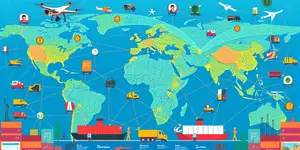
In an era defined by data, every click, search, and share contributes to a vast ecosystem that powers innovation and influences decisions. Understanding your digital footprint is key to unlocking opportunity and protecting your personal value.
The data economy is a global digital ecosystem where information is gathered, analyzed, and exchanged to generate economic benefit. From search engines to IoT devices, stakeholders harness data to optimize products, personalize experiences, and drive growth.
At its core lies the concept of a digital footprint—the unique, traceable collection of online activities you create. This includes both active footprints—like social media posts and purchases—and passive footprints—the data collected by cookies, trackers, and device sensors.
Your digital footprint begins the moment you connect. Every action contributes to a profile used by companies and platforms to refine their offerings.
Data is often dubbed "the new oil"—a commodity traded and refined into actionable insights. Companies purchase or analyze aggregated user data to:
This marketplace of information operates like any other, with supply, demand, and pricing determined by the quality and uniqueness of the data.
Governments and agencies have begun crafting frameworks to balance innovation with safety. From the Consumer Financial Protection Bureau to nascent data protection laws, regulation aims to set standards for consent, transparency, and accountability.
As a user, you hold power through awareness. Explore privacy settings, opt out of unnecessary tracking, and request data portability or deletion where regulations permit.
While the data economy offers growth, it also presents substantial risks. High-profile data breaches and unauthorized sales of personal information highlight the stakes.
Unregulated data flows can exacerbate societal inequality, as underserved communities often lack access to privacy tools or digital literacy. Early digital footprints—sometimes recorded before adulthood—carry a long-term impact on reputation, employment prospects, and even creditworthiness.
Online reviews and testimonials wield consumer power, shaping purchasing decisions and brand reputations. At the same time, insights derived from data help organizations adopt ethical and sustainable practices aligned with environmental goals.
The acceleration of AI adoption and personalization is transforming how data is processed. Machine learning algorithms refine recommendations, predictive analytics forecasts demand, and chatbots tailor customer service—all fueled by your digital traces.
Meanwhile, the proliferation of IoT devices creates multiple touchpoints for data creation—smart fridges, wearable health monitors, and connected cars amplify the volume and granularity of information collected.
Your digital footprint can be a source of strength rather than vulnerability. Consider these strategies:
By taking control, you not only protect privacy but also participate consciously in the value exchange that defines the modern digital marketplace.
Ultimately, understanding the dynamics of the data economy empowers you to make informed choices, safeguard your reputation, and leverage your digital footprint as an asset. In a world where data fuels progress, your awareness and action become the greatest catalysts for positive change.
References













